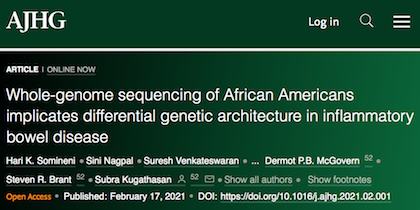In African Americans, the genetic risk landscape for inflammatory bowel disease (IBD) is very different from that of people with European ancestry, according to results of the first whole-genome study of IBD in African Americans. The authors say that future clinical research on IBD needs to take ancestry into account.

Findings of the multi-center study, which analyzed the whole genomes of more than 1,700 affected individuals with Crohn’s disease and ulcerative colitis and more than 1,600 controls, were published on February 17 in the American Journal of Human Genetics.
As part of their analysis, the researchers developed an algorithm that corrects for ancestry when calculating an IBD polygenic risk score. Polygenic risk scores are tools for calculating gene-based risk for a disease, which are used for IBD as well as other complex conditions such as coronary artery disease.
“Even though the disease destination looks the same, the populations look very different, in terms of what specific genes contribute to risk for IBD,” says lead author Subra Kugathasan, MD. “It shows that you can’t develop a polygenic risk score based on one population and apply it to another.”

Kugathasan is scientific director of the pediatric IBD program and director of the Children’s Center for Transplantation and Immune-mediated Disorders at Children’s Healthcare of Atlanta, as well as Marcus professor of pediatrics and human genetics at Emory University School of Medicine.
The first author of the paper is geneticist Hari Somineni, PhD, who earned his doctorate working with Kugathasan at Emory, and is now working at Goldfinch Bio in Massachusetts.
The primary sites to recruit study participants were Emory, Cedars-Sinai and Rutgers, along with Johns Hopkins and Washington University at Saint Louis. Along with Kugathasan, the co-senior authors and co-organizers of the study were Steven Brant, MD from Rutgers and Dermot McGovern, MD, PhD from Cedars-Sinai.
“One of our goals in treating IBD is to move toward a more personalized approach,” says McGovern, the Joshua L. and Lisa Z. Greer Chair in Inflammatory Bowel Disease Genetics at Cedars-Sinai. “Deciphering the genetic architecture is an important part of this effort. Studies such as this one are vital to ensure that diverse populations, including African-Americans, benefit from the tremendous advances promised by genomic medicine.”




